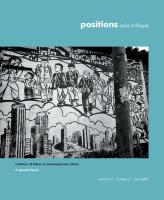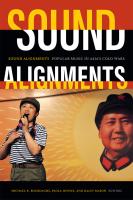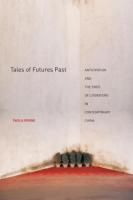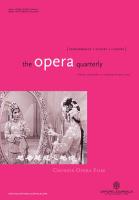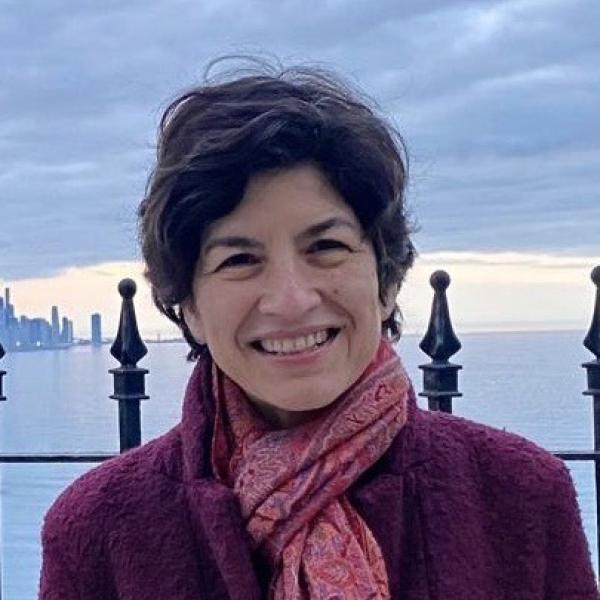
Biography
How do writers and filmmakers think about the relationship between the exploration of the possibilities of their medium and some form of responsibility—toward other beings, the world, and themselves—is the basic question that drives my work.
My first book, Tales of Futures Past: Literature and Anticipation in Contemporary China (Stanford University Press, 2014), explores how normative visions and intimate feelings about the future have shaped literary institutions, editorial practices, and diverse genres and texts (science fiction, children’s literature, translation of foreign literature, experimental fiction, and environmental literature) in socialist and postsocialist China.
My current research interests converge around three themes: the intersections between literature, labor, and social inequality; the ways in which the dichotomy of realism and modernism shapes contemporary Chinese literary historiography; and the use of actual locations in cinema. I am now working on a project on the Shaanxi writer Lu Yao, particularly on the radio broadcasts of his fiction and other media adaptations of his life and work.
I am generally drawn to the moments in which literature and cinema engage the line between fact and fiction, and have an abiding interest in documentary literature and film, especially in works that attempt to account for traumatic experiences and contentious situations or events.
I enjoy translating and am experimenting with different ways to integrate translation in my research and teaching.
Selected Publications
"Guest Editor's Introduction: Cultures of Labor and the Labor of Culture," positions: asia critique 31, 2 (2023): 257–279.
“Landscape of Words: Romance on Lushan Mountain (1980) and Sinoglossia as Delimitation,” in Sinoglossia, edited by Andrea Bachner, Howard Chiang, and Yu-lin Lee, 73-90. Hong Kong University Press, 2023.
“Translation and Avant-garde Fiction in 1980s China,” in The Bloomsbury Handbook of Modern Chinese Literature in Translation, ed. by Cosima Bruno, Lucas Klein, and Chris Song, 49-64. Bloomsbury, 2023.
“Utopias of Unalienated Labor,” in Sinophone Utopias: Exploring Futures Beyond the China Dream, ed. by Jessica Imbach, Justyna Jagusćik, and Andrea Riemenschnitter, 243-262. Cambria Press, 2023.
(with Federico Picerni) “Chinese Workers’ Literature in the 20th and 21st Centuries,” Oxford Research Encyclopedia, 2022.
Sound Alignments: Popular Music in Asia's Cold Wars, co-edited with Michael Bourdaghs and Kaley Mason. Duke University Press, 2021.
“Zheng Chouyu (1933-),” in Dictionary of Literary Biography, Volume 387: Chinese Poets Since 1949, ed. by Christopher Lupke and Thomas E. Moran, 337-44. Gale, 2021.
Tales of Futures Past: Literature and Anticipation in Contemporary China. Stanford University Press, 2014.
“A Madwoman in the Art Gallery? Gender, Mediation, and the Relation between Life and Art in Post-1989 Chinese Independent Film,” Journal of Chinese Cinemas 8, 3 (2014): 173-187.
“Ge Fei,” in Dictionary of Literary Biography. Chinese Fiction Writers, 1950–2000, edited by Thomas Moran and Ye Xu, 81-87. Detroit: Gale, Cengage Learning, 2013.
Chinese Opera Film. A Special Issue of the Opera Quarterly, co-edited with Judith Zeitlin, vol. 26, issue 2-3, Spring-Summer 2010.
"Chinese Operas on Stage and Screen: A Short Introduction," The Opera Quarterly 26, 2-3 (2010): 181-199.
"Phony Phoenixes [aka Barber Takes a Wife]: Comedy, Protest, and Marginality in Postwar Shanghai," in Sherman Cochran and Paul Pickowicz eds, China on the Margins. Ithaca: Cornell University Press, 2010, 267-287
"Why Is There a Poem in this Story? Contemporary Chinese Literature, Li Shangyin's Poetry, and the Futures of the Past." Modern Chinese Literature and Culture 19, 2 (Fall 2007): 71-116.
"Authenticity, Translation, and Postmodernity: Polemics around Han Shaogong's Dictionary of Maqiao," Annali dell'Istituto Orientale di Napoli 62, 2002: 197-218.
Translations
From Chinese into Italian
- Qiu Huadong, “Cloudbox,” Caratteri: Letteratura Cinese Contemporanea (2017)
- Han Shaogong, “Le radici della letteratura” [Wenxue de gen/The Roots of Literature], Caratteri: Letteratura Cinese Contemporanea (2016.2, Bilingual issue).
- Xu Kun, “Cucina” [Chufang/Kitchen], Caratteri: Letteratura Cinese Contemporanea (2016): 4-17.
- Ji Wenjun, “La stracciona” [Huar/The Tramp], Caratteri: Letteratura Cinese Contemporanea (2015): 53-63.
- Fan Xiaoqing, “Breve storia della città e della campagna” [Chengxiang jianshi/Brief History of Country and City] Caratteri (2014): 22-35.
- (with Silvia Pozzi) Cui Zi’en, “Il cinema digitale: le prime immagini libere” [Digital Film: The First Free Images], in Ombre Elettriche: Cento Anni di Cinema Cinese 1905-2005, edited by Marco Müller and Elena Pollacchi, 168–175. Milano: Mondadori Electa, 2005.
- Han Shaogong, “Seduzione” [Youhuo/Seduction], A Oriente! (Spring 2003): 66–77.
- Ge Fei, La Cetra Intarsiata [Jinse/The Patterned Lute]. Rome: Fahrenheit 451, 2000.
- Ge Fei, “Primo Amore” [Chulian/First Love], in Un’Altra Cina. Poeti e Narratori degli Anni Novanta: A Special Issue of In Forma di Parole, no. 1 (1999): 287–292.
- Han Shaogong, “La Profezia della Porta Nord” [Beimenkou yuyan/The Prophecy of the Northern Gate], in Un’Altra Cina. Poeti e Narratori degli Anni Novanta: A Special Issue of In Forma di Parole, no.1 (1999): 297–309.
- Lu Xun, “Ajin” [Ajin], L’immaginazione, no. 134 (1996): 2–4.
Recent Reviews
- Telling Details: Chinese Fiction, World Literature, by Jiwei Xiao. Modern Chinese Literature and Culture Resource Center.
- Beyond Imperial Aesthetics: Theories of Art and Politics in East Asia. Edited by Mayumo Inoue and Steve Choe. Prism (2022) 19 (1): 244–247.
- Wilt L. Idema, The Metamorphosis of Tianxian pei: Local Opera under the Revolution (1949-1956), CHINOPERL, 36:2 (2017), 134-139.
- Qiu Miaojin - Ultime lettere da Montmartre (http://www.lindiceonline.com/letture/narrativa-straniera/qiu-miaojin-ultime-lettere-montmartre/)
Teaching
Winter 2024
EALC 24505/34605 Adaptation and Genre in Chinese Film and Media
HUMA 14100 Reading Cultures II: Travel

